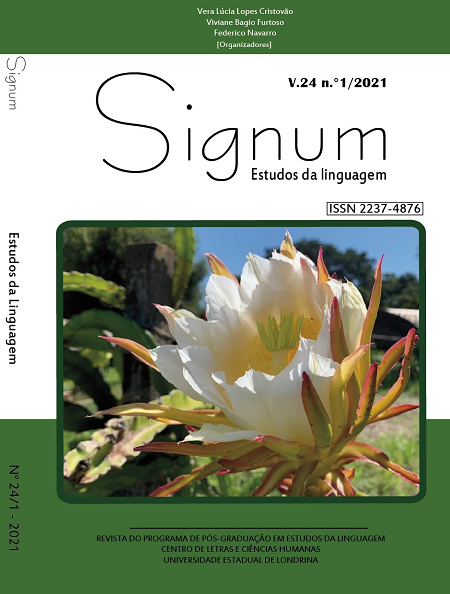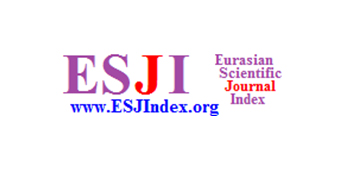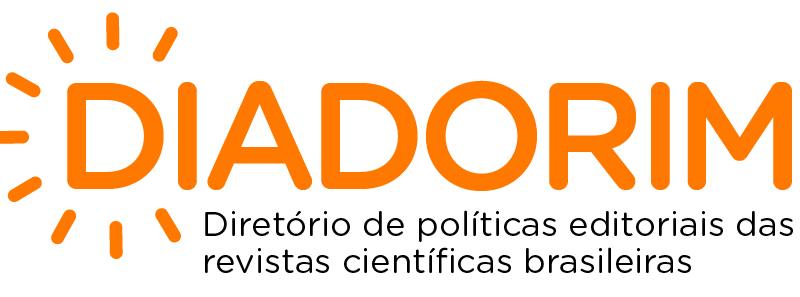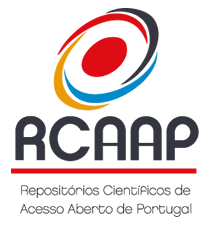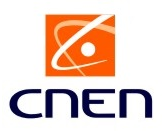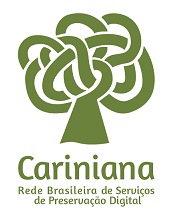Written Comments on Undergraduate Theses Written in Spanish as a First Language and English as a Foreign Language
DOI:
https://doi.org/10.5433/2237-4876.2021v24n1p62Palavras-chave:
Feedback, Genre oriented comments, Written commentsResumo
This study examines written comments of nonnative-speaking teachers of English and native-speaking teachers of Spanish on undergraduate theses of nonnative-speaking students of English and native-speaking students of Spanish. The aim of the study was to analyze the characteristics of the feedback provided applying the categories of corrective and genre oriented types of comments, and to study whether these types of comments vary through the thesis drafts. This is a descriptive qualitative study with quantitative aspects and an exploratory scope. The material was collected from the dialogic cycle of receiving and providing feedback during the students' thesis writing process. 1241 written comments were analyzed. The results showed that genre comments were more abundant in theses written in Spanish than in those written in English. However, Spanish teachers also provided more corrective comments than English teachers did.
Downloads
Referências
BAKHTIN, M. Estética de la creación verbal. Buenos Aires: Siglo Veintiuno Editores, [1979] 2011.
BASTURKMEN, H. E. M.; BITCHENER, J. Supervisors' on-script feedback comments on drafts of dissertations: Socialising students into the academic discourse community. Teaching in Higher Education, v.
19, n. 4, p. 432-445, 2014. Disponível em: https://doi.org/10.1080/13562517.2012.752728. Acesso em:
15 jan. 2021.
BAZERMAN, C. Constructing experience. Southern Illinois University Press, 1994.
BAZERMAN, C. Speech acts, genres, and activity systems: How texts organize activity and people. In: PRIOR, P.; BAZERMAN, C. (ed.). What writing does and how it does it. Mahwah, NJ: Lawrence Erlbaum,
2004. p. 309-339.
BIBER, D. et al. The Effectiveness of Feedback for L1-English and L2-Writing Development: A Meta-Analysis. Flagstaff, AZ: Northern Arizona University, 2011.
BITCHENER, J. A Genre Approach to Understanding Empirically Based Thesis Writing. Good Practice Publication Grants. AKO AOTEAROA, p. 1-11, 2009. Disponível em: https://www.scribd.com/
document/62217343/A-Genre-Approach-to-Understanding-Empirically-Based. Acesso em: 15 jan. 2021.
BITCHENER, J. et al. Best Practice in Supervisor Feedback to Thesis Students. Wellington: New Zealand: Ako Aotearoa, 2011.
BITCHENER, J.; BASTURKMEN, H. The Focus of Supervisor Written Feedback to Thesis/Dissertation Students. International Journal of English Studies, v. 10, n. 2, p. 79-97, 2010.
BITCHENER, J.; FERRIS, D. R. Written corrective feedback in second language acquisition and writing. New York: Routledge, 2012.
BITCHENER, J.; KNOCH, U. Written corrective feedback studies: Approximate replication of Bitchener & Knoch (2010a) and Van Beuningen, De Jong & Kuiken (2012). Language Teaching, v. 48, n. 3, p. 405-414, 2015. Disponível em: https://doi.org/10.1017/s0261444815000130. Acesso em: 15 jan. 2021.
BITCHENER, J.; STORCH, N. Written Corrective Feedback for L2 Development. Bristol: Multilingual Matters, 2016.
BITCHENER, J.; YOUNG, S.; CAMERON, D. The effect of different types of corrective feedback on ESL student writing. Journal of Second Language Writing, v. 14, n. 3, p. 191-205, 2005. Disponível em:
https://www.researchgate.net/publication/222682464_The_effect_of_different_types_of_feedback_on_ESL_student_writing. Acesso em: 15 jan. 2021.
CHRISTIANSEN, M. S.; BLOCH, J. Papers are never finished, just abandoned: The role of written teacher comments in the revision process. Journal of Response to Writing, v. 2, n. 1, p. 6-42, 2016.
DUIJNHOUWER, H. Feedback effects on student's writing motivation, process and performance. 2010. Tese(Doutorado) - Universiteit Utrecht, Utrecht, 2010. Disponível em: http://dspace.library.uu.nl/bitstream/
handle/1874/43968/duijnhouwer.pdf?sequence=1. Acesso em: 15 jan. 2021.
ELLIS, R. Corrective Feedback and Teacher Development. L2 Journal, v. 1, n. 1, p. 3-18, 2009. Disponível em: http://dx.doi.org/10.5070/l2.v1i1.9054. Acesso em: 15 jan. 2021.
FERRIS, D. R. [Entrevista cedida a] Laurel Waller. MA TESOL Program. East Lansing, MI: Michigan State University, 2015.
FERRIS, D. R. et al. Written corrective feedback for individual L2 writers. Journal of Second Language Writing, v. 22, p. 307-329, 2013.
FERRIS, D. R. The "Grammar Correction" Debate in L2 Writing: Where are we, and where do we go from here? (and what do we do in the meantime?). Journal of Second Language Writing, v. 13, n. 1, p. 49-62,
2004. Disponível em: http://dx.doi.org/10.1016/j.jslw.2004.04.005. Acesso em: 15 jan. 2021.
FERRIS, D. The influence of teacher commentary on student revision, Tesol Quarterly, v. 31, n. 2, p. 315-339, 1997.
HAN, Y.; HYLAND, F. Exploring learner engagement with written corrective feedback in a Chinese tertiary EFL classroom. Journal of Second Language Writing, v. 30, p. 31-44, 2015. Disponível em: http://
dx.doi.org/10.1016/j.jslw.2015.08.002. Acesso em: 15 jan. 2021.
HYLAND, F. Focusing on form: Student engagement with teacher feedback. System, v. 31, p. 217-230, 2003.
HYLAND, K. Academic Attribution: Citation and the Construction of Disciplinary Knowledge. Applied Linguistics, v. 20, n. 3, p. 341-367, 1999.
HYLAND, K. Disciplinary interactions: metadiscourse in L2 postgraduate writing. Journal of Second Language Writing, v. 13, p. 133-151, 2004.
HYLAND, K. Genre and Second Language Writing. Ann Arbor, MI: The University of Michigan Press, 2007.
HYLAND, K. Teaching and Researching Writing. New York, Routledge, 2010. (Applied Linguistics in Action).
HYLAND, K.; HYLAND, F. Feedback in Second Language Writing. Contexts an Issues. New York: Cambridge University Press, 2010.
MACKEY, A.; GASS, S. Second Language Research. Methodology and design. New York: Routledge, 2005.
NARVAJA DE ARNOUX, E. Incidencia de la lectura de pares y expertos en la reescritura de tramos del trabajo de tesis. Revista de lingüística teórica y aplicada - RLA, v. 44, n. 1, p. 95-118, 2006.
NASSAJI, H.; SWAIN, M. A Vygotskian Perspective on Corrective Feedback in L2: The Effect of Random Versus Negotiated Help on the Learning of English Articles. Language Awareness, v. 9, n. 1, p. 34-51, 2000. Disponível em: https://doi.org/10.1080/09658410008667135. Acesso em: 15 jan. 2021.
PALTRIDGE, B.; STARFIELD, S. Thesis and dissertation writing in a second language: a handbook for supervisors. London: Routledge, 2007.
RUSSELL, D. R. Rethinking Genre in School and Society. Written Communication, v. 14, n. 4, p. 504-554, 1997. Disponível em: https://doi.org/10.1177/0741088397014004004. Acesso em: 15 jan. 2021.
SOMMERS, N. Responding to Student Writers. Boston; New York: Bedford; St. Martin's, 2013.
STRAUB, R.; LUNSFORD, R. Twelve Readers Reading. Reading to College Student Writing. Cresskill, NJ: Hampton Press, 1995.
STRAUSS, A. L.; CORBIN, J. Basics of qualitative research: Grounded theory procedures and techniques. Thousand Oaks, CA: Sage Publications, 1990.
TAPIA-LADINO, M.; ARANCIBIA, M.; CORREA VENEGAS, R. Hacia un modelo retórico-discursivo del macrogénero Trabajo Final de Grado en Licenciatura. Revista Signos, v. 49, n. S1, p. 247-279, 2016.
VENEGAS, R. Hacia un modelo retórico-discursivo del macrogénero Trabajo Final de Grado en Licenciatura. Revista Signos, v. 49, n. S1, p. 247-279, 2016.
VYGOTSKY, L. Interaction between learning and development. In : GAUVAIN, M.; COLE, M. (ed.). Readings on the development of children. New York: W. H. Freeman & Company, 1997. p. 34-41.
WISKER, G. et al. From Supervisory Dialogues to Successful PhDs: Strategies supporting and enabling the learning conversations of staff and students at postgraduate level. Teaching in Higher Education, v. 8, n.
3, p. 383-397, 2003. Disponível em: https://doi.org/10.1080/13562510309400. Acesso em: 15 jan. 2021.
YUDGAR TÓFALO, G. Feedback and Process Writing: 'Dialog Boxes' as a Tool to Develop Written Conferencing Between Instructor and EFL Student Writers at an Advanced Level. Humanising Language
Teaching, v. 14, n. 2, Apr. 2012.
Downloads
Publicado
Como Citar
Edição
Seção
Licença
Copyright (c) 2021 Signum: Estudos da Linguagem

Este trabalho está licenciado sob uma licença Creative Commons Attribution-NonCommercial-NoDerivatives 4.0 International License.
Signum: Estudos da linguagem, publica seus artigos licenciados sob a Licença Atribuição-NãoComercial-CompartilhaIgual 4.0 Internacional. Esta licença permite que terceiros façam download e compartilhem os trabalhos em qualquer meio ou formato, desde que atribuam o devido crédito de autoria, mas sem que possam alterá-los de nenhuma forma ou utilizá-los para fins comerciais. Se você remixar, transformar ou desenvolver o material, não poderá distribuir o material modificado.
